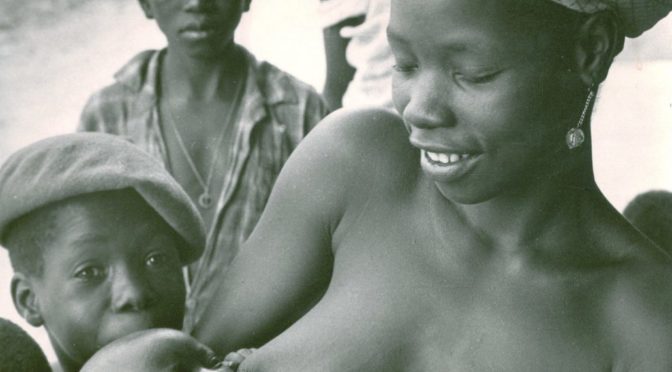The first week of August, August 1-7, is World Breastfeeding Week.
Although I’m not a mother, the negative attitudes towards breastfeeding that I see online, especially those that shame mothers who breastfeed in public, deeply disturb me.
How else can a mother breastfeed an infant regularly without confining herself to her home during that period?!
To mark this year’s World Breastfeeding Week, I’d like to write about something a little different.
Today, I’d like to share with you some information that I came across recently that highlights not only the benefits of breastfeeding, but specifically stresses the importance of giving breast milk to newborns as soon as possible after birth. Keep on reading to find out more.
READ ALSO: Get Ready for Your New Baby with an Amazon Baby Registry
According to UNICEF, half the babies born each year are not put to the breast within an hour of birth.
This deprives them of the essential nutrients, antibodies and skin-to-skin contact with their mother that protect them from disease and death.
“Making babies wait too long for the first critical contact with their mother outside the womb decreases the newborn’s chances of survival, limits milk supply and reduces the chances of exclusive breastfeeding,” points out UNICEF Senior Nutrition Adviser France Bégin.
“If all babies are fed nothing but breast milk from the moment they are born until they are six months old, over 800,000 lives would be saved every year.”
Read that again: 800,000!
According to UNICEF data, progress in getting more newborns breastfed within the first hour of life has been slow over the past 15 years.
In sub-Saharan Africa, for example, where mortality rates of children under the age of 5 are highest, early breastfeeding rates increased by just 10 percentage points since 2000 in East and Southern Africa and have remained unchanged in West and Central Africa.
According to the 2014 Tanzania National Nutrition Survey (TNNS 2014), only 50% of children in Tanzania under the age of two benefit from early initiation of breastfeeding.
In some regions, such as Tabora, Geita, Shinyanga, Rukwa and Katavi, the level is even lower at less than 25% .
The longer the delay before breastfeeding, the higher the risk of death in the first month of life.
Delaying breastfeeding by 2-23 hours after birth, i.e., breastfeeding during the first day of life but not within the first hour, increases the risk of dying in the first 28 days of life by 40%.
Delaying it by 24 hours or more increases that risk to 80%!
READ ALSO: What Products Should You Include on Your Baby Registry? & More
The Benefits of Breastfeeding
“Breast milk is a baby’s first vaccine, the first and best protection they have against illness and disease,” explains France Bégin.
“With newborns accounting for nearly half of all deaths of children under five, early breastfeeding can make the difference between life and death.”
Maniza Zaman, UNICEF Representative in Tanzania, remarks, “For many different reasons, including cultural norms and lack of knowledge, women in Tanzania are not receiving the support they need to start breastfeeding immediately after the baby is born. Giving babies other liquids or foods may be another reason early breastfeeding is delayed. We have to intensify our efforts so that many more Tanzanian children, and their mothers, benefit from optimal breastfeeding practices [and receive the full benefits of breastfeeding ].”
Breastfeeding Statistics from Tanzania and the World
Across the world, only 43% of infants under six months old are exclusively breastfed.
Babies who are not breastfed at all are 14 times more likely to die than those who are fed only breast milk.
In Tanzania, less than 41% of children under six months old were exclusively breastfed in 2014.
In some areas, like Ruvuma and Tanga, the figure is as low as 25%.
On the island of Zanzibar, 20% of children were exclusively breastfed that same year, with the figure in Pemba being as low as 10% (TNNS 2014).
What Quantity of Breast Milk Is Enough to Make a Difference?
Any amount of breast milk reduces a child’s risk of death.
Babies who received no breast milk at all are seven times more likely to die from infections than those who received at least some breast milk in their first six months of life.
Tanzania has an opportunity to further highlight the need for more efforts in good breastfeeding practices.
From August 1-7, World Breastfeeding Week will be celebrated in mainland Tanzania, along with the national farmers’ day known as “Nane Nane”.
Activities will include televised roundtable discussions as well as health and nutrition talks with mothers in health facilities and in communities highlighting the benefits of breastfeeding.
In Zanzibar, the theme will be “breastfeeding, a key to sustainable development”.
The focus will be on addressing social norms that contribute to poor breastfeeding practices.
Will you be celebrating World Breastfeeding Week this year? Did you even know a World Breastfeeding Week existed? Please let me know in the comment section below.
Until the next time,
Biche
P.S. Have you subscribed to Chick About Town yet? If not, you can do that here. Found this interesting? Then please share this post with your friends and followers on social media. Want to share this news on your own website? Feel free to do so but please link back here. Thanks. 🙂
Photo Credit: John Atherton, blacktating.blogspot.ug, TheKid



Who knew?
Well, now *I* know 🙂